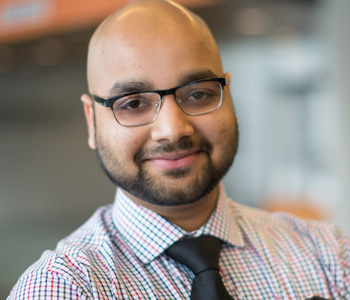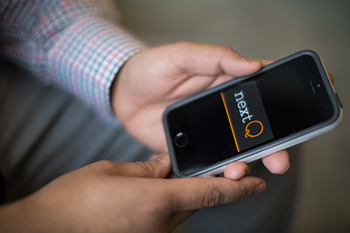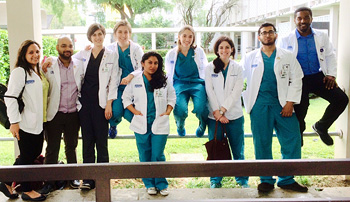

An APPtitude for Problem Solving
Mohammod Arafat: Bridging Technology & Medicine to Change Lives
Like many Einstein students, second-year medical student Mohammod Arafat decided to study medicine so he could help people.
By nature, Mr. Arafat is a problem solver. As an undergraduate, he designed a prize-winning app that helps reduce time spent waiting in lines and waiting areas, and another that pairs smart phones with medical equipment to make sharing data easier and quicker.

Second-year medical student Mohammod Arafat"You see a problem, you find a solution for it," said Mr. Arafat.
Born in Bangladesh, Mr. Arafat moved to Brooklyn when he was two years old. While he grew up in that borough's Kensington neighborhood, his family now lives in the Bronx, not far from Einstein. Following graduation from Stuyvesant High School, in Manhattan, he studied biomedical engineering at the City College of New York, in Harlem.
An "Apptitude" for App Design
Mr. Arafat's interest in mobile applications (apps) was initially sparked by his volunteer work with a nurse in the Bronx. While still an undergraduate, he helped design an app aimed at helping nurses understand various procedures through targeted videos. He also participated in app design competitions hosted by his college—winning top prize his senior year.
The winning app was inspired by long waiting times people experience at the Department of Motor Vehicles and in doctors' offices. He and his team of fellow engineering students developed NextQ, an app that allows people to check in to a virtual "line" through which they receive a text message when it's their turn. The app, which won a $50,000 Kaylie Prize for Entrepreneurship, is still used by City College's financial aid office.

Mr. Arafat's award-winning app, NextQIt was the realization that his apps often focused on helping people that led Mr. Arafat to consider medical school. "It occurred to me that the best way I could help people was through medicine," he said. "I decided I should learn about health problems so that I have the best knowledge base from which to develop helpful solutions. I want my technological skills to make a difference for patients."
A Doctor's Influence
Part of Mr. Arafat's motivation also comes from knowing personally how much impact the actions of a single doctor can have. He explained, "I was often sick as a child and spent a lot of time in and out of the hospital."
He suffered from severe asthma. And, when he was in the ninth grade, he started having seizures.
"It was a really scary time for my family. They saw me shaking in bed as I slept," he said. "But I also recall that my experiences with my doctors were all good."
Summertime Insights
"Medical school is a discovery process for me in terms of what I want to do in the future and figuring out how I'll tie my technology into it," Mr. Arafat said.
He made big strides this past summer when he began an ongoing research project under the mentorship of Dr. Eugen Palma, at the Weiler Arrhythmia Service, where he is testing the impact of electronic cardiac pacemakers on patients undergoing cardiac resynchronization therapy. This relatively new treatment aids patients with heart failure by synchronizing the left and right ventricles of the heart.

Mr. Arafat (second from left) with other Einstein students who took part in the Jacobi Medical Center burn unit’s training program in Puerto RicoResearch has shown that approximately one-third of patients are not responsive to the device, so Mr. Arafat is attempting to figure out why.
"My intention is to see if there is a difference between those who respond and those who don't, and to determine how to detect that early on so that different treatment options can be explored," he said. "It's amazing to see how a man-made device implanted in a human being extends their life and improves the quality of that life."
He also had the opportunity to observe another way technology is benefitting patients when he traveled to Puerto Rico in June, as part of a partnership between Jacobi Medical Center's Burn Intensive Care Unit and the University of Puerto Rico. In Puerto Rico, he shadowed plastic surgeons in the burn unit, in a program developed and funded by the Global Health Center.
"It was fascinating to watch surgeons use a dermatone, which is like an electric razor combined with a vacuum, to heal a 16-year-old girl who had been badly burned as a 4-year-old but never received treatment. Scars across her chest were preventing her breasts from developing, so Jacobi surgeons used the dermatone to move skin from her leg to her chest."
He added, "It was such an elegant procedure. It definitely sparked my interest in doing something with surgery in the future. There is remarkable technology behind many surgical procedures."
For now, though, Mr. Arafat is soaking up medical knowledge. "I need to know more about the human body, so I can create something useful," he said. "It's inspiring to see how others have used technology to create beneficial applications and how these are improved over time. It's something I want to be a part of."
Posted on: Wednesday, November 18, 2015

Tablet Blog